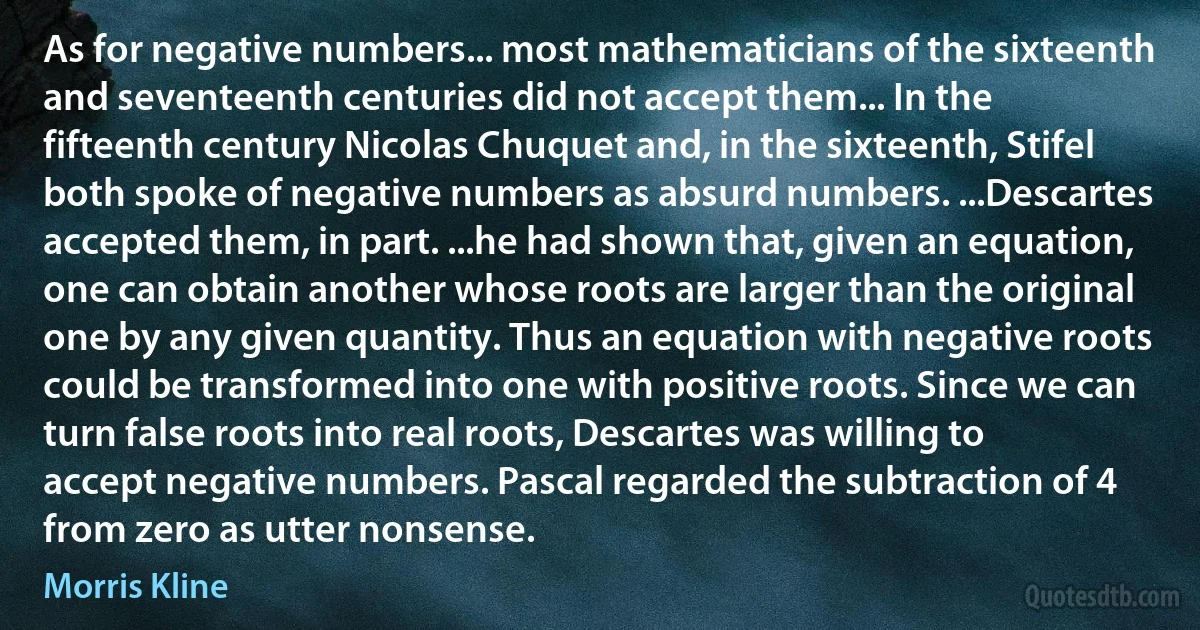
As for negative numbers... most mathematicians of the sixteenth and seventeenth centuries did not accept them... In the fifteenth century Nicolas Chuquet and, in the sixteenth, Stifel both spoke of negative numbers as absurd numbers. ...Descartes accepted them, in part. ...he had shown that, given an equation, one can obtain another whose roots are larger than the original one by any given quantity. Thus an equation with negative roots could be transformed into one with positive roots. Since we can turn false roots into real roots, Descartes was willing to accept negative numbers. Pascal regarded the subtraction of 4 from zero as utter nonsense.
Morris KlineRelated topics
century equation false fifteenth given real seventeenth show sixteenth spoke subtraction thus turn willing zero pascal descartes rootsRelated quotes
The Hindus introduced negative numbers... The first known use is Brahmagupta about 628; he also states the rules for the four operations with negative numbers. Bhāskara points out that the square root of a positive number is twofold, positive and negative. He brings up the matter of the square root of a negative number but says that there is no square root because a negative number is not a square. No definitions, axioms, or theorems are given.
The Hindus did not unreservedly accept negative numbers. Even Bhāskara, while giving 50 and -5 as two solutions of a problem, says, "The second value is in this case not to be taken, for it is inadequate; people do not approve of negative solutions."

Morris Kline
Underlying the concept of positivity is the conviction that the positive is intrinsically positive in itself, without anyone pausing to ask what is to be regarded as positive. ... It is significant and really quite interesting that the term 'positive' actually contains this ambivalence. On the one hand, 'positive' means what is given, is postulated, is there-as when we speak of positivism as the philosophy that sticks to the facts. But, equally, 'positive' also refers to the good, the approvable, in a certain sense, the ideal. And I imagine that this semantic constellation expresses with precision what countless people actually feel to be the case.

Theodor Adorno
[T]he Christian philosopher of to-day has larger capacities and fuller knowledge than the Israelite of the time of Moses. What the one accepted as literal truth the other cannot accept save as a myth or figure. The children of Israel received without idealisation the statements of their great lawgiver. To them the tables of the law were true tablets of stone, prepared, engraved, broken, and re-engraved; while the graving tool which thus inscribed the law was held undoubtingly to be the finger of God. To us such conceptions are impossible. We may by habit use the words, but we attach to them no definite meaning.

John Tyndall
Philosophy and cognitive science have contributed to the advancement of the object model. The idea that the world could be viewed either in terms of objects or processes was a Greek innovation, and in the seventeenth century, we find Descartes observing that humans naturally apply an object-oriented view of the world. In the twentieth century, Rand expanded upon these themes in her philosophy of objectivist epistemology. More recently, Minsky has proposed a model of human intelligence in which he considers the mind to be organized as a society of otherwise mindless agents. Minsky argues that only through the cooperative behavior of these agents do we find what we call intelligence.

Grady Booch
The hypothesis you refer to as God, though not disprovable by logic alone, is unnecessary for the following reason.
If you assume that the universe can be quote explained unquote as the creation of an entity known as God, he must obviously be of a higher degree of organization than his product. Thus you have more than doubled the size of the original problem, and have taken the first step on a diverging infinite regress. William of Ockham pointed out as recently as your fourteenth century that entities should not be multiplied unnecessarily. I cannot therefore understand why this debate continues.

Arthur C. Clarke
